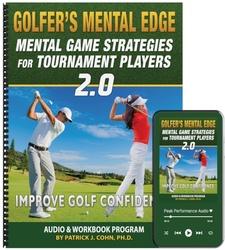
In the weeks heading into a tournament, what do you feed your mind: Positive or negative messages?
Do you hang onto past mistakes during a round or focus on the good shots you hit?
Your thoughts affect your confidence. It is pretty simple; you become what you think. If you think you are a terrible golfer, you will struggle on the golf course.
In our Golf Mental Game Survey, we received the following question:
“How do I start a tournament with confidence or keep my confidence throughout the round, especially when I am struggling with my game?”
Confidence grows or atrophies according to the messages you feed your mind. Think of it this way. If someone showed you film of every bad round you ever played, you would lose confidence.
If you thought of every mistake you made in the last year’s tournaments, you would have less confidence. If you were to list all your weaknesses and technical flaws, your confidence would plummet.
The reverse is also true. You build confidence when you call to mind times when you are on top of your game.
When you highlight your successes during a round of golf, you grow your confidence.
If you were to list your strengths, abilities, and positive aspects of your golf game, your confidence would skyrocket.
In other words, whatever you choose to hold in the forefront of your mind impacts your confidence.
Each positive thought, image, and memory builds your confidence or success resume.
Building confidence is not as complicated as most golfers make it.
For example, Gianna Clemente, 15, is the youngest competitor in the 72-player field at the 2023 Augusta National Women’s Amateur Tournament.
However, Clemente does not become rattled when competing against older golfers. First of all, Clemente prepares at a high level.
CLEMENTE: “I’ve put in a lot of hard work to prep for not only this event but the other events that I’ve had this spring as well. I’m looking forward to it.”
In addition, Clemente maintains her confidence because she consciously tends to it. Clemente keeps in mind her previous successes which include three straight LPGA events in 2022.
Earlier this year, she finished T16 at the Epson Tour’s season-opening event and is currently the top-ranked junior in the country.
CLEMENTE: “[Being young] is something that I’m pretty used to by now. I’ve been the youngest for at least a couple years now in every event that I play in. It’s a very comfortable feeling for me. It doesn’t bother me at all, and I’m just looking forward to playing some good golf.”
Instead of keeping count of all your mistakes and bad rounds, start totaling up your successes, great shots, and positive attributes.
Creating your success resume builds high-level confidence.
Don’t merely think about your successes. Write your successes in a notebook, on a spreadsheet, or create a document on your phone.
Writing down your successes, strengths, and positive attributes has a double impact. It causes you to review your positives twice…First, by thinking of them and again when you put them on paper.
Golfer’s Mental Edge 2.0

Do you suffer from fragile self-confidence after missed hitting shots or making mistakes, playing with strict or high expectations that undermine confidence, or the inability to play freely and relaxed on the course?
If you lack focus, have low self-confidence or other mental game obstacles on the course, you cant reach your true golf potential…
Successful golfers have learned how to perform with ultimate confidence in competition, so we’ve developed The Golfer’s Mental Edge 2.0 Workbook and Audio program to help you do this!
The Golfer’s Mental Edge 2.0 program includes the top 11 mental training sessions I do with my personal students to help them boost their mental game and improve consistency on the course.
The Golfer’s Mental Edge 2.0 audio program includes 11 confidence-boosting CDs, MP3 audio recordings, and an 8-session golfer’s mental edge workbook–plus several bonus programs. Available Now!
Related Articles
- Playing Golf One Shot at a Time
- Your Expectation Affects Your Golf Game
- How Short-term Goals Helps You Focus
- Subscribe to The Golf Psychology Podcast on iTunes
- Subscribe to The Golf Psychology Podcast on Spotify